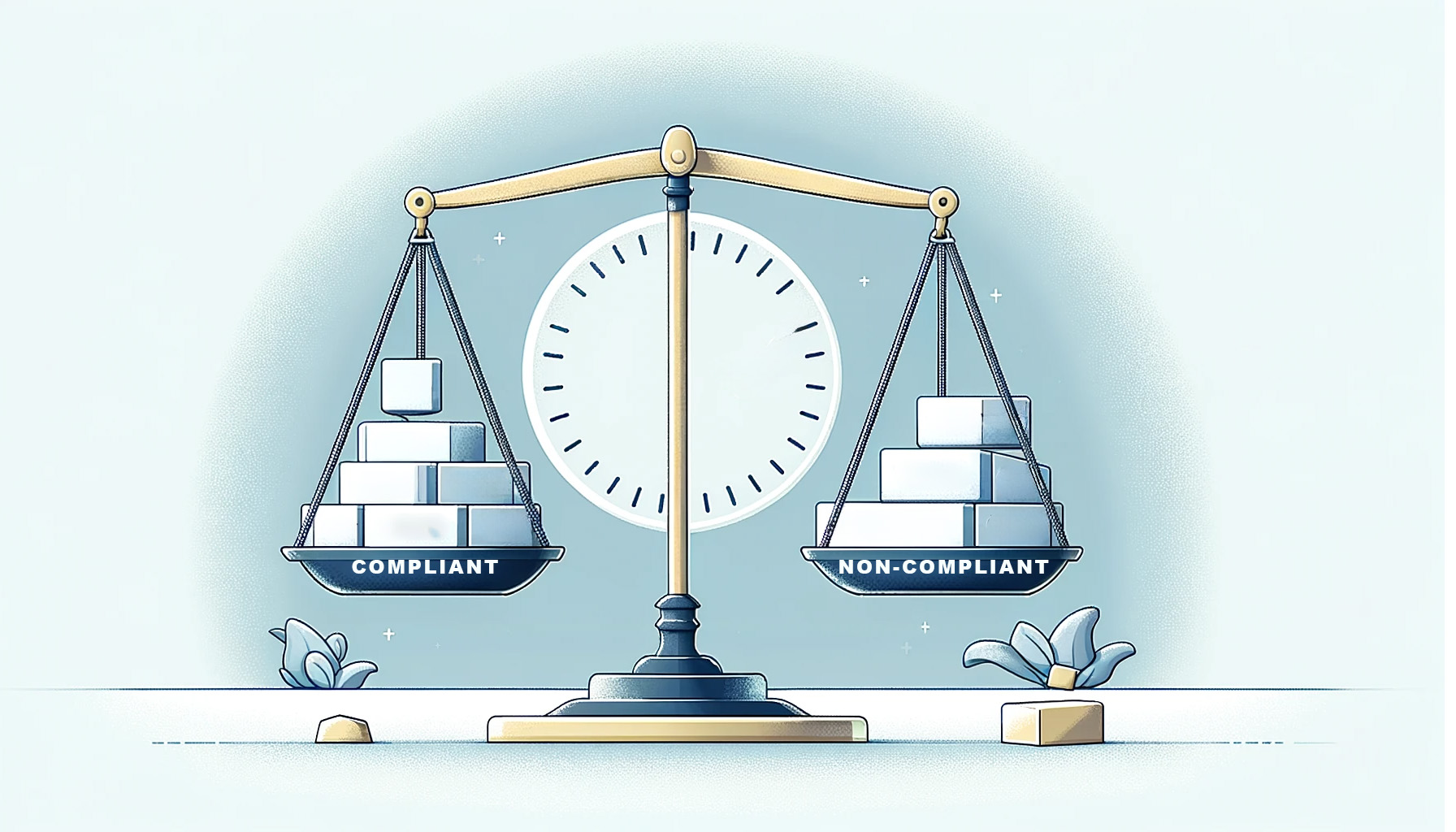
Navigating FTC Compliance and Avoiding Legal Pitfalls in the Supplement Industry
Apr 7, 2023 4 minutes
The supplement industry is booming with an ever-increasing demand for products that help consumers achieve their health and wellness goals. However, with great opportunity comes great responsibility, and in this dynamic industry, compliance and staying on the right side of the law are of utmost importance.
Here at DirectPayNet, we’re well-versed in the realm of compliance and have a wealth of experience helping high-risk businesses like yours navigate the often-complex landscape of rules and regulations. We understand how crucial it is to avoid takedown notices and any potential conflicts with the Federal Trade Commission (FTC).
With that in mind, we’ve put together this friendly and informative guide to help you stay compliant and maintain a stellar reputation. You can also use the FTC’s own new health products compliance guidance in addition to our third-party literature below. Their new guide is a replacement for one titled Dietary Supplements: An Advertising Guide for Industry which was published in 1998 and is clearly outdated.
These are the 4 best things any supplement merchant can do to maintain compliance and stay far away from the FTC and the Food and Drug Administration’s watchful eye.
1. Monitor Reputation and Address Customer Complaints
In today’s digital age, a business’s reputation can make or break its success. Consumers often rely on online reviews and ratings to make purchasing decisions, so it’s essential to maintain a positive reputation for your supplement business.
By doing so, you’ll not only attract new customers but also keep your existing ones coming back for more.
By actively monitoring your reputation and addressing customer complaints on public consumer testimonial platforms, you’ll not only demonstrate your commitment to customer satisfaction but also foster a positive image for your supplement business. This, in turn, can lead to increased trust among potential customers, which can translate into higher sales and long-term success for your business.
Who knows, maybe those burnt customers can turn into expert endorsements.
One of the most prominent resources that consumers turn to when assessing a company’s reputation is the Better Business Bureau (BBB). The BBB is a nonprofit organization that assigns ratings to businesses based on various factors, including the number of complaints received and how they’ve been resolved. A positive BBB rating can significantly boost your credibility and trustworthiness in the eyes of potential customers.
How to Monitor Your BBB Page
To stay on top of your BBB reputation, make it a habit to regularly monitor your business’s page on the BBB website. You can sign up for notifications that will alert you when new reviews or complaints are posted.
By doing this, you can quickly address any issues that may arise and demonstrate to both existing and potential customers that you value their feedback.
Assigning a Team Member to Address Complaints
To ensure that customer complaints are handled promptly and effectively, designate a member of your team to monitor your BBB page and other review platforms.
This person should be well-versed in your company’s policies and practices, as well as possess excellent communication skills. They should be responsible for acknowledging complaints, addressing them with empathy and professionalism, and working towards a satisfactory resolution.
ALWAYS respond to customer complaints in the politest way possible. The best outcome is when you can convince that customer to mark their review or comment as resolved.
Has a bad reputation sabotaged your business? We can help!
2. Oversee Affiliate Marketing and Product Representation
Affiliate marketing plays a significant role in the supplement industry as it allows businesses to tap into a vast network of promoters who can help expand their reach and boost sales.
However, it’s essential to remember that, as a supplement business owner, you are ultimately responsible for how your product is represented, regardless of who is promoting it.
You need to ensure that your affiliates are promoting your products in a manner that is accurate, transparent, and compliant with all relevant regulations. This means that any health-related claims made by your affiliates must be supported by reliable scientific evidence, and they should not engage in misleading or deceptive marketing practices.
To maintain compliance and uphold your brand’s reputation, follow these guidelines for monitoring your affiliates:
- Regularly review affiliate content: Periodically check your affiliates’ websites, social media posts, and other promotional materials to ensure they are making accurate claims about your health-related products and adhering to your brand guidelines.
- Ensure accurate and compliant claims: Provide your affiliates with clear instructions and resources to help them understand what they can and cannot say about your products. This may include a comprehensive list of approved marketing claims, any necessary disclaimers, and new guidance on how to reference scientific studies.
- Provide training and resources for affiliates: Offer training sessions, webinars, or other educational materials, like an implied claims and advertising claim substantiation standard, to help your affiliates stay up to date on the latest industry regulations and best practices. This will not only empower them to promote your products more effectively but also reduce the risk of non-compliance.
If your affiliates engage in non-compliant marketing practices, your supplement business could face serious consequences, including hefty fines, takedown notices, and damage to your brand’s reputation.
Whether you’re selling homeopathic drugs, prescription drugs, health-related apps, medical devices, or other homeopathic products you must pay equal attention to the health benefit claims and conspicuous disclosures from your own storefront as your affiliate promoters. The FTC’s enforcement actions will always land on you.
By staying vigilant and actively monitoring your affiliates’ promotional activities, you can mitigate these risks and maintain the trust of your customers and regulatory authorities.
3. Implement Comprehensive Legal Documentation
Transparency and compliance are crucial for building trust with your customers and avoiding legal issues. One of the most effective ways to demonstrate your commitment to these principles is by implementing comprehensive legal documentation on your website.
Clear and accessible policies not only help protect your business from potential legal disputes but also provide customers with the information they need to make informed purchasing decisions.
To ensure your website is compliant and user-friendly, be sure to include the following essential legal documents:
- Terms and Conditions (T&C): Your T&C should outline the rules and guidelines that customers must agree to when using your website or purchasing your products. This may include information on product usage, intellectual property rights, and limitations of liability.
- Privacy Policy: A privacy policy is crucial for demonstrating your commitment to protecting customer data. This document should outline what personal information you collect, how it’s used, and the steps you take to safeguard it. Be sure to comply with applicable data protection laws, such as the General Data Protection Regulation (GDPR) and the California Consumer Privacy Act (CCPA).
- Refund Policy: Providing a clear refund policy helps build trust with customers and can minimize disputes. Outline the conditions under which customers can request a refund, the process for doing so, and any applicable timeframes or fees.
All these policies should be unique to your business. DO NOT copy and paste the terms or refund policy from another business. There are too many risks. We recommend hiring a lawyer to write your or at least review the one you have (especially if it was copied from elsewhere). There are also many terms and services generators out there that cost very little.
In addition to having comprehensive legal documentation, it’s essential to provide your company’s contact information on your website. This should include your company name and address in the footer. Displaying your company name and address prominently in the footer of your website not only helps establish credibility but also ensures compliance with various e-commerce regulations.
DirectPayNet Makes Compliance Easy
4. Maintain Ethical Business Practices
Some businesses may operate multiple companies or brands under a single umbrella. While this can be a viable strategy for diversification, it’s essential to maintain ethical business practices when handling customer information.
- Privacy concerns: Transferring customer information between companies without proper consent can lead to privacy breaches and erode trust in your brand. Customers expect their personal information to be handled responsibly and securely, so it’s crucial to respect their preferences and adhere to relevant data protection laws.
- Legal implications: Sharing customer information without proper consent or disclosure can result in serious legal consequences, including fines, regulatory action, and damage to your business’s reputation.
Another key aspect of maintaining ethical business practices involves the management of merchant accounts for processing customer payments.
- Separate accounts for different businesses: If you own multiple businesses, it’s essential to maintain separate merchant accounts for each one. This ensures that customer payments are processed correctly and transparently, avoiding any potential confusion or disputes.
- Consequences of charging customers from the wrong account: Charging customers from one company on another company’s merchant account can lead to serious financial and legal issues. Both businesses are at risk of being shut down and you could be put on the MATCH list.
Aside from the above, it’s important to understand other legal and ethical aspects of selling over-the-counter drugs (OTC) and other healthcare supplements. We have a guide here for FDA approval and compliance that covers labeling, cautions, qualifying information as well as the type of claims and type of products you can sell.
Reliable results are just as important to your reputation and compliance as DSHEA disclaimers and FTC law.
By prioritizing ethical business practices, you can foster trust among your customers and demonstrate your commitment to their satisfaction. This, in turn, can lead to increased loyalty, positive word-of-mouth, and long-term success for your supplement business. Always remember that maintaining high ethical standards is not only the right thing to do but also a smart business strategy.
Is Your Supplement’s Business Truly Compliant?
In the fast-paced and competitive world of the supplement industry, staying compliant and maintaining a positive reputation are essential for long-term success. By implementing the strategies outlined in this blog post, you can minimize the risk of legal issues and build a strong foundation of trust with your customers.
To recap, you can use the FTC guidance document, and below are the four key takeaways every supplement business should prioritize:
- Monitoring your company’s reputation on sites like the BBB and addressing customer complaints in a timely manner
- Keeping a close eye on what affiliates are saying about your product and ensuring that their claims are accurate and compliant
- Implementing comprehensive legal documentation on your website, including Terms and Conditions, Privacy Policy, and Refund Policy, while displaying your company’s name and address prominently
- Upholding ethical business practices, particularly when it comes to handling customer information and maintaining separate merchant accounts for different businesses
As a supplement business owner, it’s your responsibility to adhere to industry regulations and maintain the highest ethical standards in your operations. By doing so, you can not only avoid costly legal pitfalls but also create a loyal customer base and a thriving, successful business.
At DirectPayNet, we’re committed to helping you navigate the complex world of compliance and risk management. We hope that this guide has provided valuable insights and actionable tips to help you stay on the right track. If you have any questions or need further assistance, don’t hesitate to reach out to our team of experts.
SUPPLEMENTS ARE HIGH-RISK, ARE YOU USING THE RIGHT PAYMENT PROCESSOR?




